Thibaut Pinot - Seven moments that defined a career
Reliving the memories, from Tour turmoil to the sanctuary of Italy, as Frenchman farewells professional racing at Il Lombardia
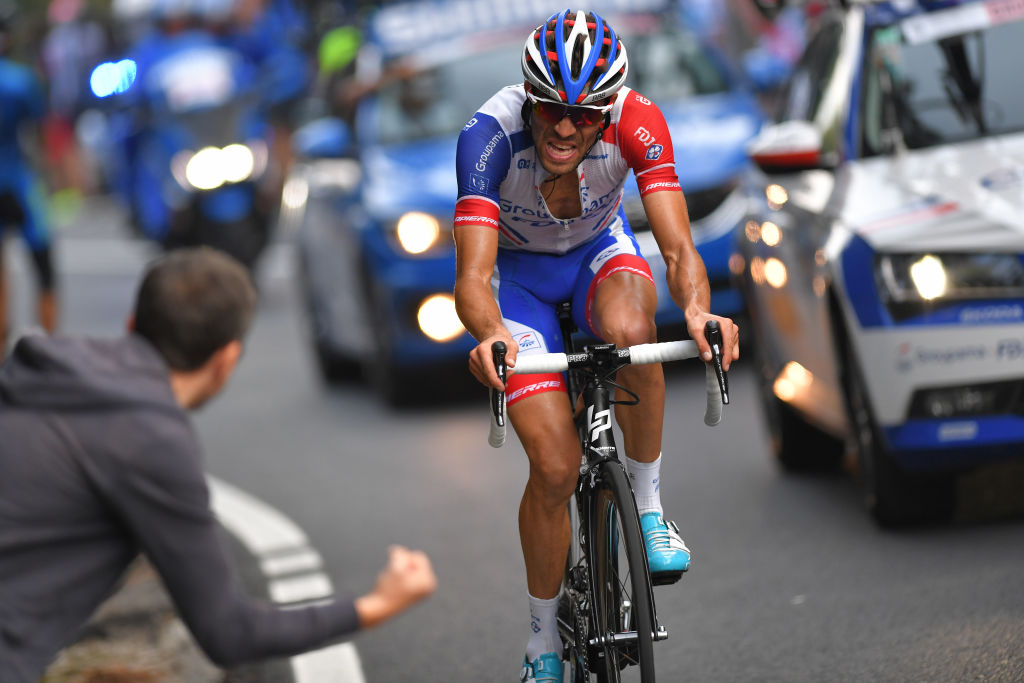
Thibaut Pinot already enjoyed a farewell of sorts when he went on the attack on the penultimate stage of the Tour de France, roared on by thousands upon thousands of his home fans in the Vosges, but the Frenchman formally brings the curtain down on his career at Il Lombardia on Saturday.
Italy has always been a happy hunting ground for Pinot and it’s perhaps fitting that he signs off at the Race of the Falling Leaves, which he won in such assured fashion in 2018. Pinot is unlikely to repeat that feat this weekend, but that won’t matter a jot to the Collectif Ultra Pinot, who will form the Curva Thibaut on the final climb of the Colle Aperto.
Victory was only ever a part of the story for Pinot, as he explained in a long interview with Pierre Carrey of Le Temps on Friday. “When you love cycling, you don’t really care whether a rider wins,” Pinot said. “When you look at it, the power of sport isn’t about winning, it’s about sharing emotions, whether they’re good or bad.”
Ahead of Pinot’s final race, Cyclingnews looks back at some of the defining moments of a career that marked its era.
2012 – The Breakthrough
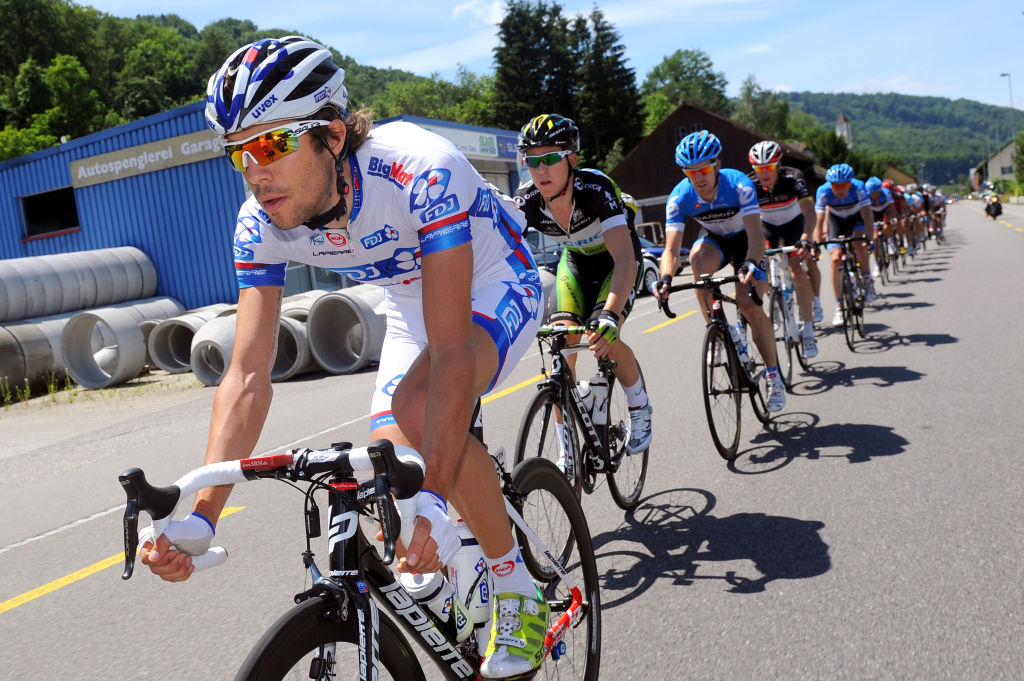
Thibaut Pinot’s victory at the 2009 Giro della Valle d’Aosta had marked him out as the coming man of French cycling, and he continued to underline that potential with some striking cameos on turning professional with FDJ the following year. FDJ – sensibly – spared Pinot from the rigours of Grand Tour racing in his first two seasons as a professional, but they tentatively pencilled him in for the Vuelta a España at the end of 2012.
Not for the last time, however, Pinot saw things a little differently to his manager Marc Madiot. La Planche des Belles Filles, a stone’s throw from his native Mélisey, featured on the Tour route for the first time that summer and Pinot was loath to miss out on the grand occasion. Against his own misgivings, Madiot was talked around, and Pinot was thrust onto the grandest of stages. Just weeks after his 22nd birthday, he was the youngest rider in the Tour.
At La Planche, Pinot would struggle under the weight of Sky’s relentless forcing and, perhaps, under the burden of his own expectations, but he would make amends in spectacular fashion a day later on the rolling road to Porrentruy. Pinot defied team orders to join a counter-attack midway through the stage before catching and passing lone leader Fredrik Kessiakoff on the Col de la Croix.
Get The Leadout Newsletter
The latest race content, interviews, features, reviews and expert buying guides, direct to your inbox!
Not for the last time, Madiot offered some decidedly performative encouragement out the window of the team car as his young charge soloed to a stylish victory, but the moment belonged to Pinot, and Pinot alone. Yellow jersey Bradley Wiggins’ press conference that same afternoon is best remembered for his rant about “bone-idle” sceptics, but he had words of admiration, too, for the day’s winner. “The first time I saw him was last year at the Dauphiné and I noticed that he had something special about him from the way he pedalled and carried himself on the bike," Wiggins said.
2013 – The Descent
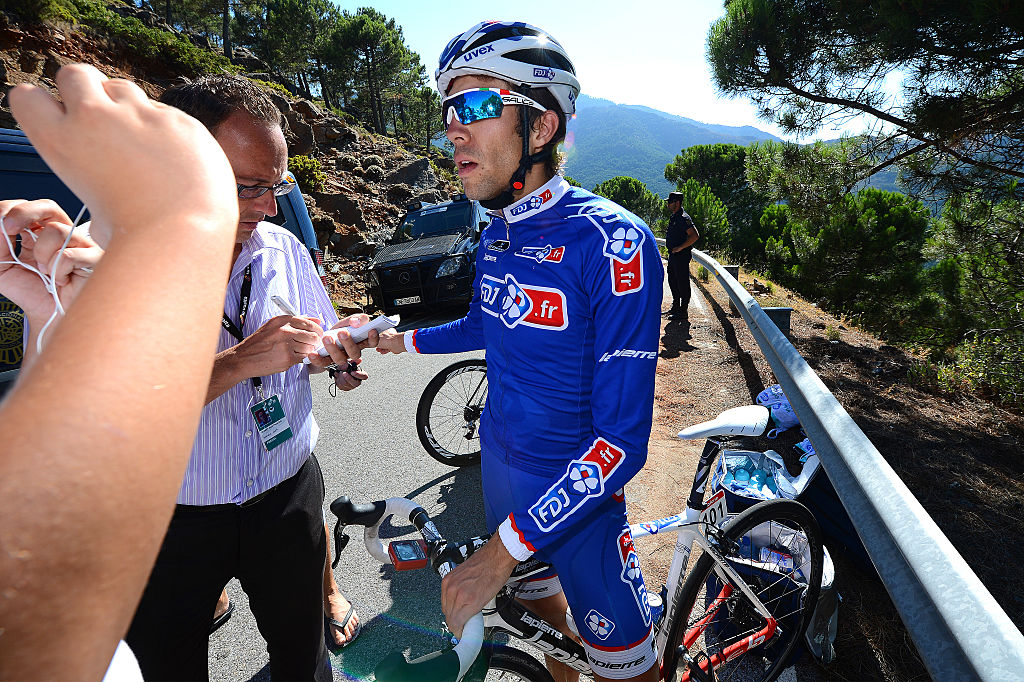
Two days after Pinot reached Paris in 10th place at the end of his debut Tour, the front page of L’Équipe asked the premature but obvious question that would serve as the background noise to his every act for most of his career: “Can Pinot win the Tour de France?”
By then, it was already almost three decades since Bernard Hinault’s 1985 triumph and in the aftermath of the Festina Affair, the home nation had stopped producing Tour contenders altogether. For some, Thomas Voeckler’s surprising fourth place in 2011 had seemed to signal the end of the era of “cyclisme à deux vitesses,” but that performance was very clearly a one-off. Pinot, on the other hand, was a thoroughbred talent, and so the burden of home expectation was entirely his.
Pinot’s fourth place finish at the 2013 Tour de Suisse raised French hopes further before that year’s Tour, but his challenge would unravel when he was dropped on the descent of the Porte de Pailhères on the very first mountain stage of the race, losing six minutes by the finish at Ax 3 Domaines. The problem, Pinot admitted afterwards, was psychological rather than physical. The mental stresses of the race took a toll. “Some people are afraid of spiders or snakes,” Pinot told L’Équipe. “I’m afraid of speed. It’s a phobia.”
It was unusual for a rider to confess so openly to such fragility, and, cruelly, Pinot’s reward was the Prix Citron for least cooperative rider on the 2013 Tour – voted upon, it should be said, by a rather limited selection of Francophone journalists. By then, Pinot had long since abandoned the Tour after repeatedly shipping time in the mountains and falling ill in the second week. The honeymoon was over.
2014 – The Podium
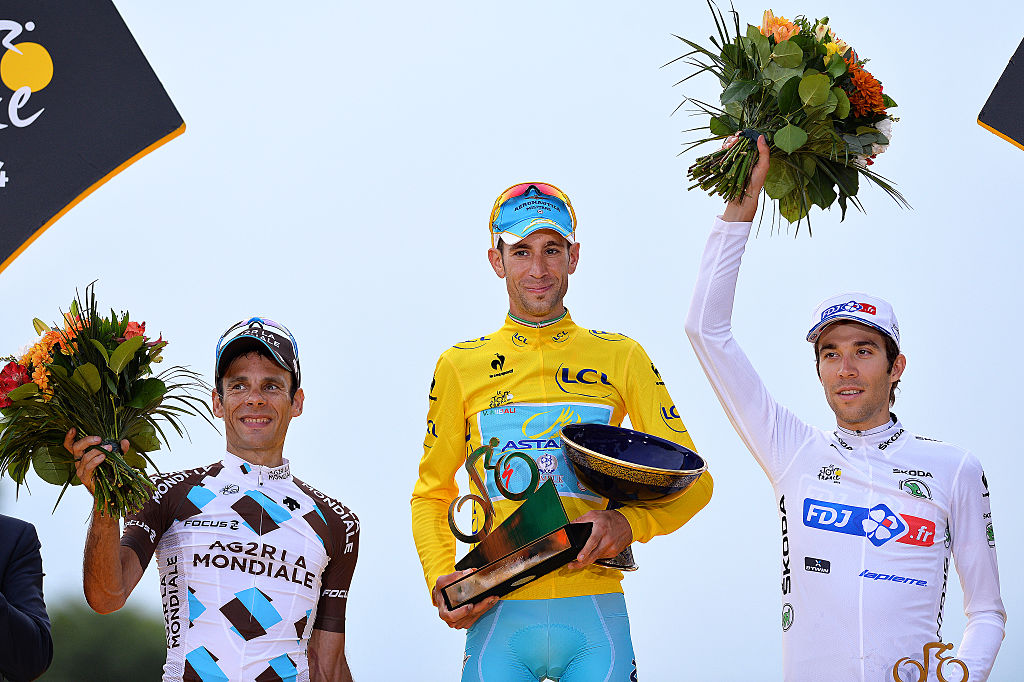
2013 set the tone for Pinot’s future relationship with the Tour, but there was a reprieve twelve months later. Indeed, looking back over Pinot’s entire career, the 2014 race stands as something of an outlier. Perhaps it says something about Pinot’s appeal that his best Tour finish came in one of his least memorable appearances. For once, there were no alarms and no surprises across the three weeks. He performed consistently all the way from Yorkshire to Paris, outlasting Alejandro Valverde to claim the third step of the podium on the Champs-Élysées.
Overall winner Vincenzo Nibali’s dominance brooked no argument, especially once Chris Froome and Alberto Contador had been forced out, but Pinot and his compatriot Jean-Christophe Péraud did enough to put the home nation on the podium for the first time in seventeen years, albeit more than seven minutes down on the unassailable Italian. Pinot took second behind Nibali at La Planche and Hautacam, and his strength in the third week, in particular, seemed to augur well for his future prospects at the race.
Twelve months later, Pinot’s Tour would return to a more familiar pattern. He arrived in Utrecht with the highest of aspirations only for his GC challenge to wilt in the face of Sky’s supersonic display at Pierre Saint Martin. The two remaining weeks proved something of an ordeal until Pinot salvaged his race with a sparkling victory atop Alpe d’Huez on the final weekend. He would learn that it’s not the despair that kills you, it’s the hope.
2017-2018 The Italian Interlude
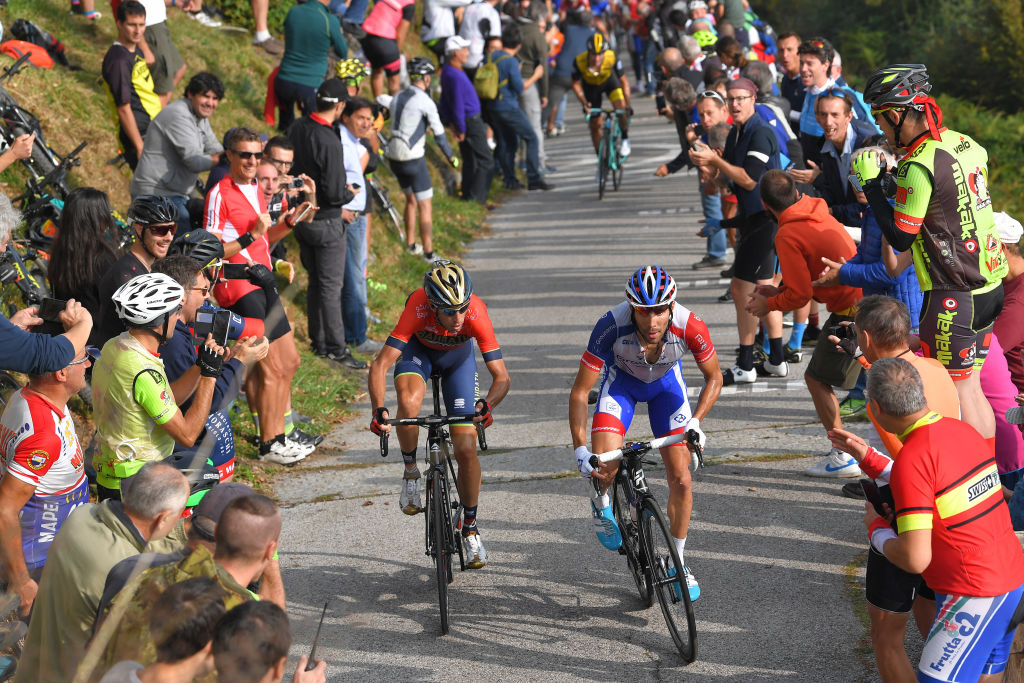
By 2017, Pinot was fed up with having his seasons defined by the Tour de France. In 2016, for instance, he was one of the peloton’s outstanding performers through the first half of the year, but another Tour abandon – this time caused by injury – seemed to overshadow everything he had achieved to that point.
Pinot had always had an affinity with Italy and all things Italian, and he finally managed to persuade FDJ to send him to the Giro d’Italia. Life on the other side of the Alps proved to be a revelation, not least because the glare of the media spotlight was finally directly elsewhere, and Pinot could go about his business in relative peace.
The 2017 Giro was arguably the best Grand Tour of the decade, and Pinot shone in a high-calibre field: he was in contention for overall victory all the way to the final weekend against Vincenzo Nibali, Nairo Quintana and eventual winner Tom Dumoulin. He would have to settle for fourth in Milan, but a stage win in Asolo on the penultimate day offset that disappointment.
A year later, Pinot performed better again across the three weeks, and he looked destined for a podium finish as the race reached its denouement, but his dogged and doomed pursuit of Chris Froome on the absurd stage over the Finestre would exact a heavy toll. A seriously ill Pinot would lose 45 minutes the next day and his race would finish in a hospital bed in Aosta rather than on the podium in Rome.
"I would like people to know how much Thibaut has exhausted himself throughout his career to do his sport and to make people happy,” Pinot’s mother Marie-Jeanne said of the incident this year.
And yet, Pinot would lift himself again by year’s end and, on Italian roads, claim the finest victory of his career. Two stage wins at the Vuelta and a victory at Milano-Torino confirmed Pinot’s form, but he saved his best for the big occasion, dropping Primož Roglič, Egan Bernal and, finally, Vincenzo Nibali himself on the Civiglio to win Il Lombardia. Italy always provided a sanctuary.
2019 – The Injury
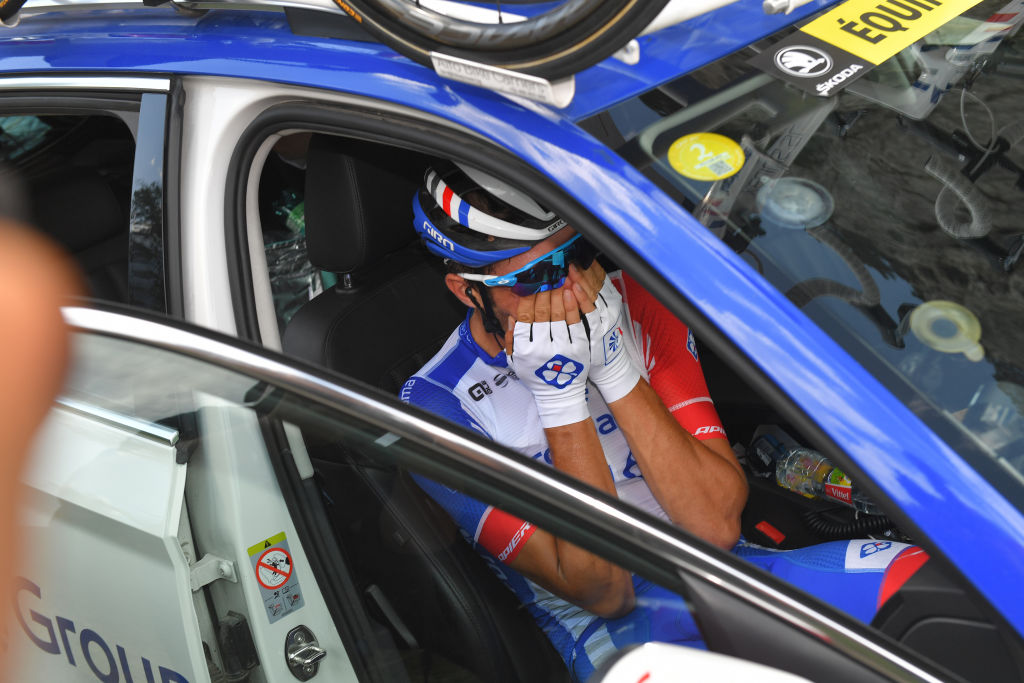
Julian Alaphilippe donned the yellow jersey for two weeks and Egan Bernal wore it into Paris, but this will always be remembered as the Thibaut Pinot Tour. In some respects, those three, dizzying weeks in July felt like the distillation of his entire career. The cruel way it all finished up was a reminder that cycling’s terrible beauty lies in its tendency to provide altogether more heartbreak than happiness.
Before the race even began, Pinot outlined the essential paradox of his cycling life. He wasn’t entirely sure he wanted to win the Tour at all, even though his every waking hour was devoted to that precise goal. “It’s not an obsession,” Pinot admitted to L’Équipe before the race began. “I like my life as it is at the moment. It’s the life I dreamt of and if I win the Tour de France, I won’t have this life anymore. Do I want to change my life? No.”
In the same interview, however, Pinot expressed confidence that, eventually “the planets would align” for him at the Tour after two consecutive abandons. And, for much of the race, it looked as though his luck had finally turned. Ineos were no longer dictating terms and conditions like the Team Sky of old, and Pinot raced with intent and growing confidence, most notably when he stole clear with Julian Alaphilippe on the road to Saint-Étienne.
When Pinot needlessly conceded ground in echelons two days later, the same, forlorn old story seemed to be repeating itself, but he lifted himself once again in the Pyrenees, powering to stage victory atop the Tourmalet. Maybe this really was the year. Ahead of the Alps, Pinot looked to be the best climber in the race, and he lay fourth overall, 1:50 down on Alaphilippe but just 15 seconds behind the defending champion Geraint Thomas.
The Tour was there to be won, and stage 19 over the Col d’Iseran was always likely to be the decisive day. Pinot, however, didn’t make it to the Tour’s highest point. On the minor ascent of the Montee d'Aussois, the Frenchman was suddenly and inexplicably dropped from the yellow jersey group. Within minutes, he had abandoned the Tour in tears, the victim of a thigh injury of mysterious provenance.
Shortly after the Tour, Pinot’s turmoil was laid bare in the fly-on-the-wall documentary Avec Thibaut. In his hotel room after the fateful stage, Madiot tried, unsuccessfully, to lift his rider’s spirits. “What did I do to deserve this?” Pinot asked.
The sorrowful mysteries of Pinot’s relationship with the Tour defied all explanation, but that was what made his narrative so compelling. AJ Liebling's description of Archie Moore’s unsuccessful attempt to take Rocky Marciano’s world heavyweight title in 1955 sprang to mind: “What would ‘Moby Dick’ be if Ahab had succeeded? Just another fish story.”
2022 – The Comeback
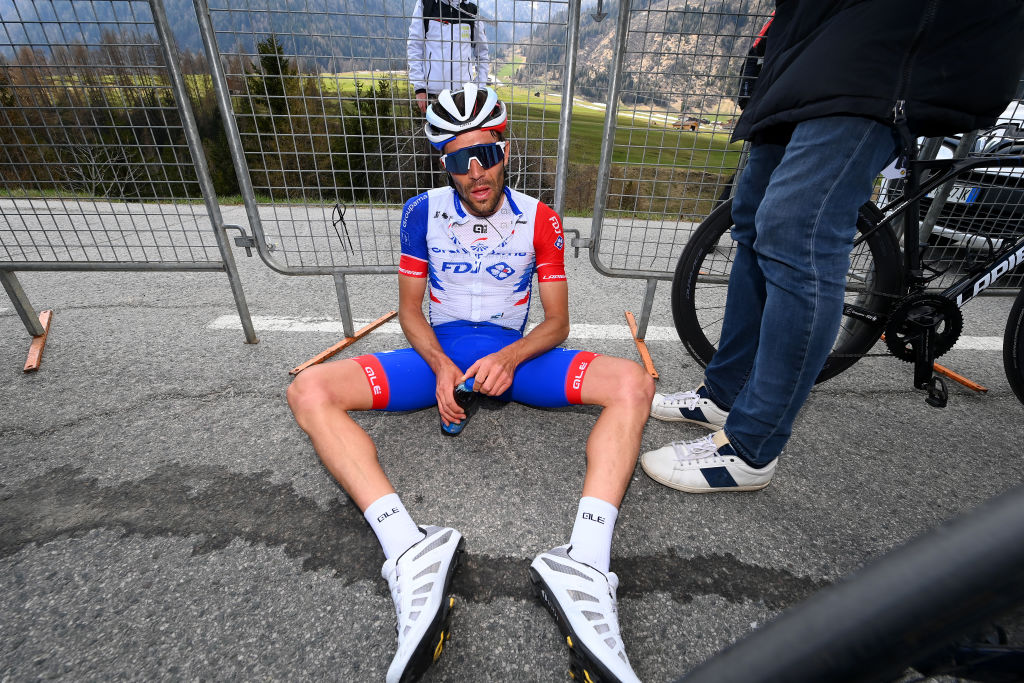
Pinot wasn’t to know it at the time, but the window on his hopes of winning the Tour slammed shut that day in the Alps. He lined up for the 2020 Tour armed with the usual hopes, but they were dashed on the very first day, when he crashed in the final kilometre in Nice.
He laboured through the rest of that pandemic-delayed Tour, largely to break his streak of abandons and to avoid the indignity of sitting at home when the race climbed La Planche des Belles Filles on the final weekend, but that effort came at a cost. A nagging back injury ruined Pinot’s 2021 season and he was still a rider in search of himself when he lined up at the 2022 Tour of the Alps.
When Pinot attacked from the break in the finale of stage 4 to Kals am Grossglockner, he looked destined to claim his first win since the Tourmalet in 2019 only for Miguel Ángel López to catch and pass him in the last kilometre to deny him the spoils. The frustration was more than Pinot knew could bear. He was in tears when he sat on the road past the finish line. “I wish life would smile on me for one day, but I have to be patient,” Pinot said.
As it turned out, he would only have to wait one more day. On the final stage to Lienz, Pinot escaped with David de la Cruz, and he outlasted the Spaniard to claim his first win in 1,007 days. As a young man, Pinot had the legend “solo la vittoria è bella” tattooed on his arm, but experience had eventually taught him there was a lot more to life. The real beauty lay not in winning, but in refusing to be beaten.
2023 – The Farewell
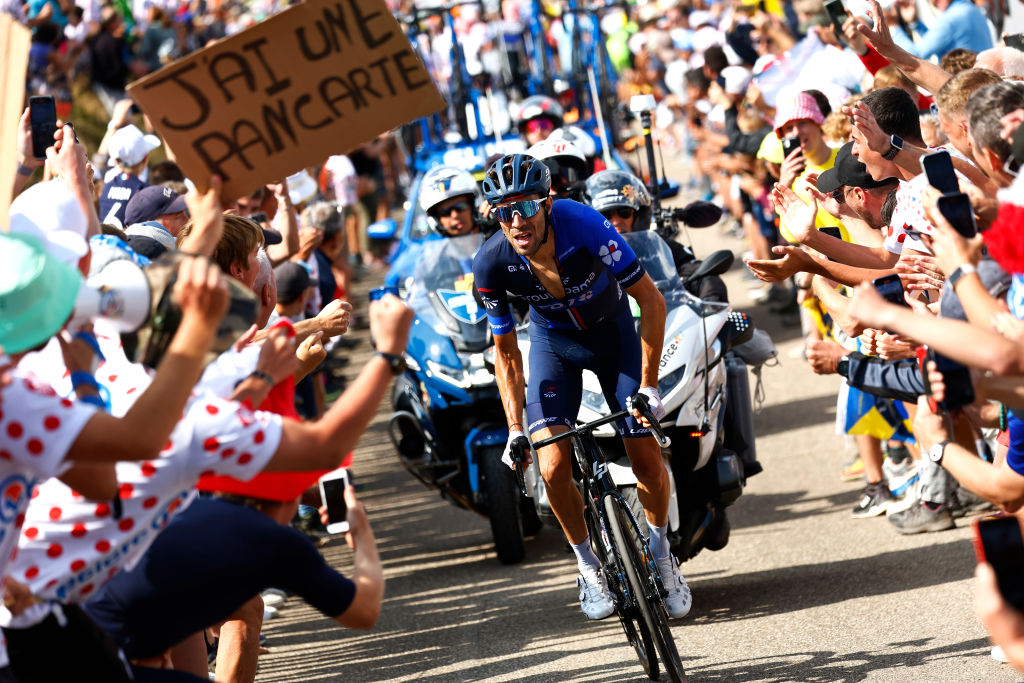
When Pinot announced his retirement from professional cycling at the start of this year, one wondered if 2023 would amount to little more than a lap of honour. Instead, Pinot’s final season provided a most fitting send-off, starting with the interview he accorded to L’Équipe in January, when he again expressed misgivings about the vast grey areas that exist within cycling’s anti-doping rules.
Pinot began his career understandably unsure whether it was possible for a rider to be successful without doping. Despite all he achieved, he ended it uncertain as to whether he had always competed on the same terms as some of his rivals. "It didn't ruin [my career], but it often frustrated me. Or put doubts in my mind," Pinot said of doping. “How many times did I finish second or third, knowing full well, or having strong suspicions, that in fact the victory was mine...”
In May, Pinot returned to his beloved Giro, where once again, he ran the gamut of emotions. He suffered frustration and heartbreak when Einer Rubio beat him to the line at Crans Montana, and he was beaten into second place at Val di Zoldo in the final week too. Still, his efforts weren’t in vain. Pinot’s aggression carried him to fifth overall, while he also – belatedly - climbed onto the podium in Rome as king of the mountains winner.
At the Tour, Pinot targeted a valedictory stage win, and his best effort came on the penultimate stage, which took in his training roads in the Vosges. After bridging up to the break on the Col de Grosse Pierre, Pinot pressed clear alone on the Petit Ballon, where thousands upon thousands of his adoring fans – the so-called Collectif Ultra Pinot – had gathered to pay homage. As he beat a path through that wall of noise, it even briefly looked as though he might pull off the impossible.
But the storybook ending of a farewell stage win wouldn’t have been true to the narrative. Pinot went down fighting, but he was caught by the yellow jersey group on the final ascent of Platzerwasel. He would reach Le Markstein in 7th place, sealing 11th overall in Paris, but those were only statistics.
Pinot’s appeal could never be explained by simple numbers or reduced to mere victories. When all is said and done, it’s the emotions and memories that endure.

Barry Ryan was Head of Features at Cyclingnews. He has covered professional cycling since 2010, reporting from the Tour de France, Giro d’Italia and events from Argentina to Japan. His writing has appeared in The Independent, Procycling and Cycling Plus. He is the author of The Ascent: Sean Kelly, Stephen Roche and the Rise of Irish Cycling’s Golden Generation, published by Gill Books.